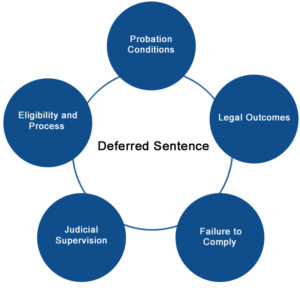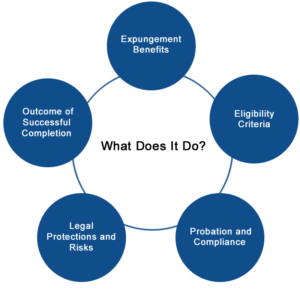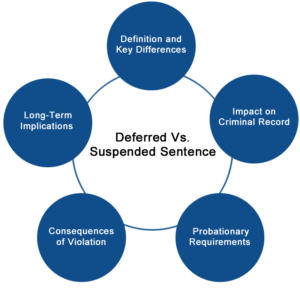Deferred Sentence in Oklahoma
 In the State of Oklahoma, a deferred sentence is a way for those accused of a crime to avoid a criminal conviction and delay final judgement until they finish a proscribed set of probation conditions. How it essentially works is this – if a person pleads no contest or guilty to a crime, the judge can delay judgement rather than call for an immediate conviction. Placing the person on probation gives them a chance to show the court they can meet all set requirements and follow the law.
In the State of Oklahoma, a deferred sentence is a way for those accused of a crime to avoid a criminal conviction and delay final judgement until they finish a proscribed set of probation conditions. How it essentially works is this – if a person pleads no contest or guilty to a crime, the judge can delay judgement rather than call for an immediate conviction. Placing the person on probation gives them a chance to show the court they can meet all set requirements and follow the law.
There are several conditions the judge may set during deferred sentence probation, including:
- Completing Mandatory Drug or Alcohol Treatment Programs or Court-Ordered Counseling
- Submitting to Regular Drug Testing
- Providing Compulsory Community Service
- Agreeing to Court Supervision for Up To Two Years
- Avoiding Contact with Known Criminals
- Adhering To All State, Federal and Local Laws
- Paying Set Fines, Attorney Fees and Court Costs
- Possibly Completing Jail Time (up to 90 days for some offenses)
- Making Restitutions or Satisfying Other Court Conditions
Upon completing all the conditions of the probation, the defendant’s plea would be changed to “not guilty,” and the judge would move to dismiss the case. This allows for a fresh start and possible expungement of the conviction from their criminal record, as they were not convicted.
Failure to meet any of the above conditions will result in the prosecution filing what’s known as a “Motion to Accelerate.” At this point, the judge could choose to end the probation period early, uphold the original guilty plea and sentence the defendant based on the original charges. The time spent on probation will not be considered as time served, meaning the defendant can expect to face the full sentence as described by the law.
Who is Eligible for a Deferred Sentence in Oklahoma?
Deferred sentencing is generally reserved for those who have a clean criminal history, or for those whose only criminal convictions are for non-violent offenses. If you have a felony conviction on your record, specifically within the last 10 years, you will likely not be eligible for a deferred sentence, although exceptions can be made in some cases. However, if you have a conviction or pled guilty to a serious sex-related crime and are registered as a sex offender, you are barred from receiving a deferred sentence.
What Does a Deferred Sentence Do?
 If you are eligible, serving your deferred sentence will act as a second chance, automatically expunging – at least partially – your criminal record upon completion. This sets it apart from a suspended sentence, which is a similar form of probation that does not include automatic expungement.
If you are eligible, serving your deferred sentence will act as a second chance, automatically expunging – at least partially – your criminal record upon completion. This sets it apart from a suspended sentence, which is a similar form of probation that does not include automatic expungement.
Partial expungement essentially allows you to legally say that the case never happened, as certain parts of the criminal record will be sealed. Some elements of the conviction will still be accessible to the public, depending on the type of offense and specific charges. Depending on the particular nature of the charges, Oklahoma offers either full expungement, removing the record completely from public view, or partial expungement.
Partial expungement is offered to those who have committed certain misdemeanor or non-violent felonies, but it’s also available to those who have been convicted of multiple charges. In that case, the charges that were dismissed would be restricted, but the remaining charges would be visible on a criminal background check. And even when records have been partially expunged, they will be invisible to employers or the general public, but not to law enforcement and government agencies.
If this conviction represents your first criminal case, or if enough time has passed since you were last convicted of a crime, the prosecutor may offer a deferred sentence. By pleading to a deferred sentence, you do not technically receive a conviction and the judge will make it clear that they are withholding a finding of guilt while you serve your probation. At the end of that deferred sentence, the judge will dismiss your case, making it as if the case never happened. However, that dismissal only comes when you successfully complete your deferred sentence.
Essentially, this serves as a delay in your sentencing in which you can work to avoid a conviction, paying all fines and costs and serving the terms of your probation. This deferred sentence can be as short as 30 days or as long as 10 years, although it typically averages between six months and five years. If you commit a crime during that time or violate the terms of the deferred sentence in any way, the state can file an application to accelerate your deferred sentence and impose the original sentence for a guilty verdict. While you’re on deferred sentence, it will show up on a background check which could impact gun purchasing rights or employment.
Deferred Vs. Suspended Sentence
 The state of Oklahoma describes two different methods for serving probation: deferred sentencing and suspending sentencing. While they are similar concepts, they work in distinctly different ways.
The state of Oklahoma describes two different methods for serving probation: deferred sentencing and suspending sentencing. While they are similar concepts, they work in distinctly different ways.
Under a deferred sentence, you are placed on probation for a set period of time during which you must pay all fines, attend all mandatory treatments and counseling, perform any required community service, and maintain a clean criminal record. At the end of that period, your guilty plea is changed to not guilty, your case is dismissed, you are not convicted in the eyes of the law and are free to seek an expungement of your record.
Under a suspended sentence, you must follow similar probationary conditions for a set period of time. And like a deferred sentence, if you fail to meet the conditions set by the court you may be imprisoned. The prime difference in a suspended sentence, however, is that successful completion still leaves you with a conviction on your permanent record, impacting long-term opportunities for housing, education or employment.
To sum up, a deferred sentence lets you serve probation instead of having a conviction on your record. A suspended sentence does not affect your conviction, but can reduce the total amount of jail time.
Expunging Your Record in Oklahoma
All a deferred sentence does is remove the conviction from your permanent record, but your criminal record will still show the sentence. To expunge it from your record under Oklahoma Title 22 O.S. § 18 you must satisfy certain criteria including serving your deferred sentence and having no pending charges. In addition, a certain amount of time needs to have passed since the deferred sentence. This is typically a year for misdemeanors.
Getting a Deferred Sentence
Receiving a deferred sentence in the state of Oklahoma is a complex legal process, one best handled with help. As such, your first step should always be to consult with your attorney. They will be able to assess your eligibility for a deferred sentence, judging your criminal history and the nature of the charges against you. Using their guidance, you will begin seeking out a deferred sentence by first:
Negotiating With the Prosecutor: At this stage, your attorney will present any extenuating circumstances behind the case, share your background such as a clean criminal record, and show the prosecutor that you are willing to meet the requirements set by the court for a deferred sentence.
Present Your Case in Court: If the prosecutor agrees that you qualify for a deferred sentence, the decision then goes to the judge who will review the particulars of your case, your criminal history and the nature of the charges to make a final determination. If the judge agrees with the prosecutor’s assessment, they will issue a deferred sentence and outline the conditions you’ll need to meet.
How We Give You an Edge in Court
 At The Edge Law Farm, we understand that the only sure defense against criminal charges is exhaustive preparation. From the moment we take on your case, our investigators turn over every rock to find the most obscured exculpatory evidence. We dig deeper, forming a robust defense around the framework of intensive investigation into the facts.
At The Edge Law Farm, we understand that the only sure defense against criminal charges is exhaustive preparation. From the moment we take on your case, our investigators turn over every rock to find the most obscured exculpatory evidence. We dig deeper, forming a robust defense around the framework of intensive investigation into the facts.
These facts serve as ammunition in court, helping us pick apart the prosecution’s argument, challenge the official law enforcement narrative, sew doubt about any accusations made against you and defend your freedom. It’s a relentless approach to justice that has helped us defend countless clients just like you.
Contact us today to schedule a free, no-obligation review of your legal case. This will give you the opportunity to see the strategies available to you, to build on your own understanding of the law and your case, and to strengthen your confidence going forward. The entire process costs you nothing, but helps you gain peace of mind that you’ve found the right team to defend your case.
Please submit our secure contact form below:
